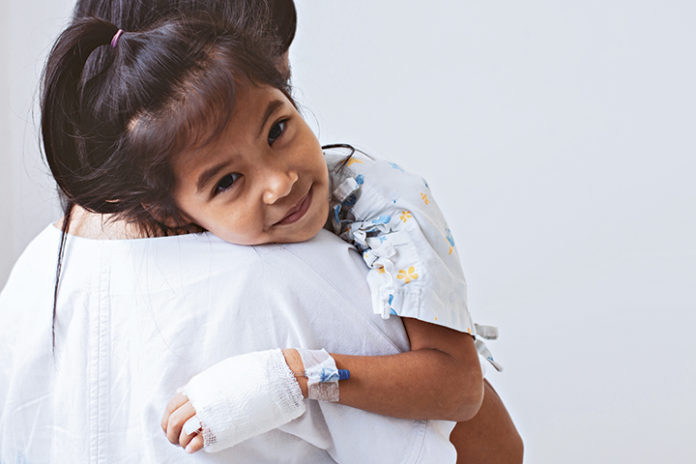All children experience pain. Two-thirds of children in hospital experience procedures with no pain management, one in five children will develop chronic pain after surgery, and upwards of 3 million Canadian children will experience chronic pain before adulthood. As recently as the 1970s and 1980s it was believed that babies, especially premature babies, didn’t feel pain. We’ve come a long way, but we’re still failing children when it comes to pain. Fortunately, Canada is a world leader in research about children’s pain and there are many simple, evidence-based and cost effective things patients, parents, caregivers, and health professionals can do to help children have less pain — IF they know about them. There is a well-established body of existing research on children’s pain, and a lot of what we know from this research is not being used in the clinical setting.
The goal of SKIP is to get that information out there. For example, inadequate pain management is reported for children during routine vaccinations and medical procedures, after surgery, and in the context of chronic pain and disease. We consider the three Ps of pain management: physical, psychological, and pharmacological. Evidence-based strategies for babies include breastfeeding, skin-to-skin contact, and sucrose (sugar water) during painful procedures. For older children, strategies include distraction, deep breathing, relaxation, and numbing cream for vaccinations. We think of needles as “Quick! Get it done!” But if we restrain a child, what happens next time? Sometimes a parent knows about a new pain management practice, but is confronted by a resistant health professional. Sometimes it’s the health professional who has the best information, but works within an organization that lacks the tools and resources to implement it.
People who work with children love children — no one wants to see them suffer, but many don’t know there’s another way. Health professionals often lack training in pain management, and sometimes pain management isn’t part of the culture of an institution. Part of what we need to overcome is the idea that pain isn’t a big deal. We know from decades of research that poorly managed pain, especially early in life, has a negative impact on children’s brains and bodies. They are at risk of experiencing more pain as adults, avoiding necessary health care like vaccinations, and developing more complex problems with pain and substance misuse. It’s about helping people realize that there are significant and long-term consequences to not addressing pain, and there are simple things you can do to help children that don’t cost anything or take extra time. We often think that health professionals are constantly accessing and implementing new research. But we know it can take up to 17 years for new research to reach the patients and caregivers who will benefit from it!
As shared by Isabel Jordan, a SKIP Patient Partner and parent of a youth with a rare genetic disease, “We had all these incredibly problematic experiences with procedural pain. In the moment, we were given no options. I now know there are evidence-based solutions and things could have been done differently. The thought that all this research is happening and it’s just sitting there on a shelf makes me angry! I know other families are going through this. We need to change clinical practice. Even when parents and caregivers know the best ways to manage their child’s pain, it’s vulnerable and scary to go up against someone with power and say, “I know how to do this better.””.
The SKIP approach is a new way to mobilize knowledge in healthcare. SKIP facilitates collaboration between patients, caregivers, researchers, health professionals, institutions, and partners like start-ups and government in a synergistic way. Together, we drive change in organizations and throughout the healthcare system. When you have a patient or caregiver who feels empowered, health professionals armed with information, and health centres prioritizing children’s pain, outcomes are improved. SKIP works to empower patients and caregivers, ensures health professionals have access to the best information, supports healthcare administrators in creating environments that support change, and helps the healthcare system embrace new ways of managing children’s pain.
SKIP is co-led by Dr. Christine Chambers, SKIP’s Scientific Director, and Doug Maynard, SKIP’s Knowledge User Director who work closely with SKIP’s Assistant Scientific Director, Dr. Katie Birnie, and the rest of the SKIP team across Canada. SKIP has four regional hubs (IWK Health Centre, Children’s Healthcare Canada, The Hospital for Sick Children, Stollery Children’s Hospital) and three affiliates (BC Children’s Hospital, Alberta Children’s Hospital, Children’s Hospital Shared Health Manitoba). Together, we can push boundaries and think outside the box of traditional healthcare. SKIP’s work will ultimately help children and families as better pain management leads to healthier Canadians.
SKIP is funded by the Networks of Centres of Excellence (NCE), based at Dalhousie University and co‐led by Children’s Healthcare Canada. Visit www.kidsinpain.ca for more information or follow us @kidsinpain.




